Mobile crowd computing: potential, architecture, requirements, challenges, and applications

Owing to the enormous advancement in miniature hardware, modern smart mobile devices (SMDs) have become computationally powerful. Mobile crowd computing (MCC) is the computing paradigm that uses public-owned SMDs to garner affordable high-performance computing (HPC). Though several empirical works have established the feasibility of mobile-based computing for various applications, there is a lack of comprehensive coverage of MCC. This paper aims to explore the fundamentals and other nitty–gritty of the idea of MCC in a comprehensive manner. Starting with an explicit definition of MCC, the enabling backdrops and the detailed architectural layouts of different models of MCC are presented, along with categorising different types of MCC based on infrastructure and application demands. MCC is compared extensively with other HPC systems (e.g. desktop grid, cloud, clusters and supercomputers) and similar mobile computing systems (e.g. mobile grid, mobile cloud, ad hoc mobile cloud, and mobile crowdsourcing). MCC being a complex system, various design requirements and considerations are extensively analysed. The potential benefits of MCC are meticulously mentioned, with special discussions on the ubiquity and sustainability of MCC. The issues and challenges of MCC are critically presented in light of further research scopes. Several real-world applications of MCC are identified and propositioned. Finally, to carry forward the accomplishment of the MCC vision, the future prospects are briefly elucidated.
This is a preview of subscription content, log in via an institution to check access.
Access this article
Subscribe and save
Springer+ Basic
€32.70 /Month
- Get 10 units per month
- Download Article/Chapter or eBook
- 1 Unit = 1 Article or 1 Chapter
- Cancel anytime
Buy Now
Price includes VAT (France)
Instant access to the full article PDF.
Rent this article via DeepDyve
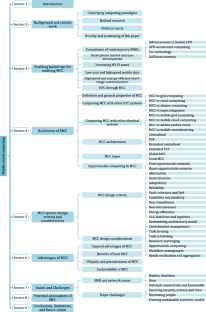



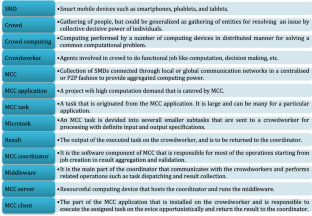
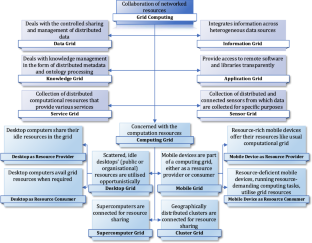

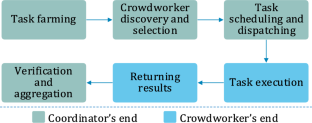
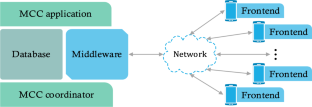




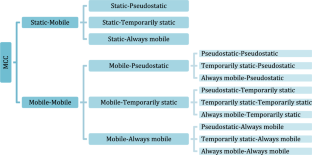
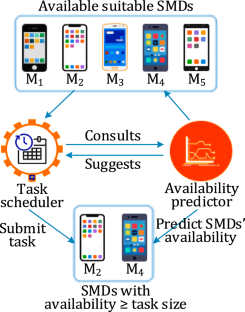
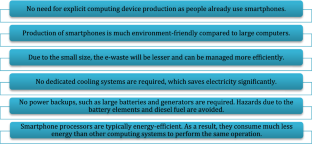
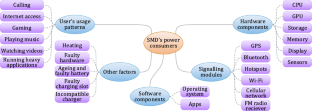
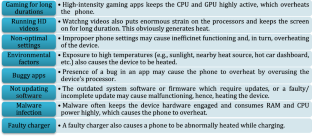
Similar content being viewed by others
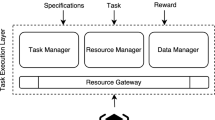
Crowdcloud: a crowdsourced system for cloud infrastructure
Article Open access 30 August 2018

Scalability Support with Future Internet in Mobile Crowdsourcing Systems
Chapter © 2021

A Survey of Mobile Cloud Computing Applications: Perspectives and Challenges
Article 14 October 2014
Explore related subjects
Data availability
All data generated or analysed during this study are included in the manuscript.
Notes
References
- Swedin EG, Ferro DL (2007) Computers: the life story of a technology, Baltimore. Johns Hopkins University Press, Maryland Google Scholar
- Foster I, Kesselman C (eds) (1998) The grid: blueprint for a new computing infrastructure. Morgan Kaufmann Publishers, San Francisco Google Scholar
- Brynjolfsson E, Hofmann P, Jordan J (2010) Cloud computing and electricity: beyond the utility model. Commun ACM 53(5):32–34 Google Scholar
- Korri T (2009) “Cloud computing: utility computing over the Internet,” In: TKK T-110.5190 Seminar on Internetworking
- Buyya R (2009) “Market-oriented cloud computing: vision, hype, and reality of delivering computing as the 5th utility,” In: 4th ChinaGrid Annual Conference, Yangtai, China
- Bonnington C (2015) “In less than two years, a smartphone could be your only computer,” 10 February 2015. [Online]. Available: http://www.wired.com/2015/02/smartphone-only-computer/. [Accessed 16 August 2022]
- StatCounter Global Stats, “Mobile and tablet internet usage exceeds desktop for first time worldwide,” 1 November 2016. [Online]. Available: http://gs.statcounter.com/press/mobile-and-tablet-internet-usage-exceeds-desktop-for-first-time-worldwide. [Accessed 16 August 2022].
- Pramanik PKD, Pal S, Brahmachari A, Choudhury P (2018) Processing IoT data: from cloud to fog. It’s time to be down-to-earth. In: Karthikeyan P, Thangavel M (eds) Applications of security mobile analytic and cloud (SMAC) technologies for effective information processing and management. IGI Global, pp 124–148 Google Scholar
- Black M, Edgar W (2009) “Exploring mobile devices as grid resources: using an x86 virtual machine to run BOINC on an iPhone,” In: 10th IEEE/ACM International Conference on Grid Computing, Melbourne, Australia
- Farooq U, Khalil W (2006) “A generic mobility model for resource prediction in mobile grids,” In: International Symposium on Collaborative Technologies and Systems, Las Vegas, USA
- Viswanathan H, Lee EK, Rodero I, Pompili D (2015) Uncertainty-aware autonomic resource provisioning for mobile cloud computing. IEEE Trans Parallel Distrib Syst 26(8):2363–2372 Google Scholar
- Büsching F, Schildt S, Wolf L (2012) “DroidCluster: towards smartphone cluster computing - the streets are paved with potential computer clusters,” In: 32nd International Conference on Distributed Computing Systems Workshops, Macau, China
- Datla D, Chen X, Tsou T, Raghunandan S, Hasan SM, Reed J, Fette B, Dietrich CB, Kim JH, Bose T (2012) “Wireless distributed computing: a survey of research challenges.” IEEE Commun Magaz 50(1):144–152 Google Scholar
- Shila DM, Shen W, Cheng Y, Tian X, Shen XS (2017) AMCloud: toward a secure autonomic mobile ad hoc cloud computing system. IEEE Wirel Commun 24(2):74–81 Google Scholar
- Nishio T, Shinkuma R, Takahashi T, Mandayam NB (2013) “Service-oriented heterogeneous resource sharing for optimizing service latency in mobile cloud,” In: First international workshop on Mobile cloud computing & networking, Bangalore, India
- Yaqoob I, Ahmed E, Gani A, Mokhtar S, Imran M, Guizani S (2016) Mobile ad hoc cloud: a survey. Wirel Commun Mob Comput 16(16):2572–2589 Google Scholar
- Habak K, Ammar M, Harras KA, Zegura E (2015) “FemtoClouds: leveraging mobile devices to provide cloud service at the edge,” In: 8th International Conference on Cloud Computing, New York, USA
- Hirsch M, Mateos C, Zunino A (2018) Augmenting computing capabilities at the edge by jointly exploiting mobile devices: a survey. Futur Gener Comput Syst 88(November):644–662 Google Scholar
- Hirsch M, Mateos C, Zunino A, Majchrzak TA, Grønli TM, Kaindl H (2021) “A simulation-based performance evaluation of heuristics for dew computing,” In: 54th Hawaii International Conference on System Sciences, Maui, Hawaii
- Hirsch M, Mateos C, Zunino A, Majchrzak TA, Grønli T-M, Kaindl H (2021) A task execution scheme for dew computing with state-of-the-art smartphones. Electronics 10(16):2006 Google Scholar
- Loke SW, Napier K, Alali A, Fernando N, Rahayu W (2015) Mobile computations with surrounding devices: proximity sensing and multi layered work stealing. ACM Trans Embedded Comput Syst 14(2):1–25 Google Scholar
- N. Fernando, S. W. Loke and W. Rahayu, “Honeybee: a programming framework for mobile crowd computing,” in Mobile and Ubiquitous Systems: Computing, Networking, and Services (MobiQuitous 2012). Lecture Notes of the Institute for Computer Sciences, Social Informatics and Telecommunications Engineering, vol. 120, K. Zheng, M. Li and H. Jiang, Eds., Berlin, Heidelberg, Springer, 2013, pp. 224–236.
- Fernando N, Loke SW, Rahayu W (2019) Computing with nearby mobile devices: a work sharing algorithm for mobile edge-clouds. IEEE Transactions on Cloud Computing 7(2):329–343 Google Scholar
- Zavodovski A, Corneo L, Johnsson A, Mohan N, Bayhan S, Zhou P, Wong W, Kangasharju J (2021) “Decentralizing computation with edge computing: potential and challenges,” In: Interdisciplinary Workshop on (de) Centralization in the Internet (IWCI'21), Germany
- Tanenbaum AS, Steen MV (2007) Distributed systems: principles and paradigms, 2nd edn. Pearson, New Jersy Google Scholar
- Quinn MJ (1994) Parallel computing: theory and practice. McGraw-Hill Education, India Google Scholar
- Baker M, Buyya R (1999) “Cluster computing at a glance”, in High Performance Cluster Computing - Architectures and Systems. USA, Prentice Hall PTR, New Jersey, pp 3–47 Google Scholar
- Baker M, Buyya R (1999) Cluster computing: the commodity supercomputer. Journal of Software: Practice and Experience 29(6):551–576 Google Scholar
- Mengistu TM, Che D (2020) Survey and taxonomy of volunteer computing. ACM Comput Surv 52(3):1–35 Google Scholar
- Durrani MN, Shamsi JA (2014) Volunteer computing: requirements, challenges, and solutions. J Netw Comput Appl 39:369–380 Google Scholar
- Anderson DP (2007) “iSGTW opinion - volunteer computing: grid or not grid?,” 4 July 2007. [Online]. Available: https://sciencenode.org/feature/isgtw-opinion-volunteer-computing-grid-or-not-grid.php. [Accessed 6 August 2022]
- Korpela EJ (2012) SETI@home, BOINC, and volunteer distributed computing. Annu Rev Earth Planet Sci 40:69–87 Google Scholar
- Milojicic DS, Kalogeraki V, Lukose R, Nagaraja K, Pruyne J, Richard B, Rollins S, Xu Z (2003) “Peer-to-peer computing,” HP Laboratories Palo Alto
- Barkai D (2000) “An introduction to peer-to-peer computing,” In: Intel Developer Update Magazine, pp. 1–7
- Xu D, Li Y, Chen X, Li J, Hui P, Chen S, Crowcroft J (2018) A survey of opportunistic offloading. IEEE Communications Surveys & Tutorials 20(3):2198–2236 Google Scholar
- Conti M, Kumar M (January 2010) Opportunities in opportunistic computing. Computer 43(1):42–50 Google Scholar
- Kristensen MD (2010) “Scavenger: Transparent development of efficient cyber foraging applications,” In: IEEE International Conference on Pervasive Computing and Communications (PerCom), Mannheim, Germany
- Ahangar MRH, Taba MRE, Ghafouri A (2017) On a novel grid computing-based distributed brute-force attack scheme (GCDBF) by exploiting botnets. International Journal of Computer Network and Information Security 6:21–29 Google Scholar
- Strickland JW, Freeh VW, Ma X, Vazhkudai SS (2005) “Governor: autonomic throttling for aggressive idle resource scavenging,” In: 2nd International Conference on Autonomic Computing (ICAC'05), Seattle, USA
- Rosales E, Sotelo G, Vega A, Díaz CO, Gómez CE, Castro H (2015) Harvesting idle CPU resources for desktop grid computing while limiting the slowdown generated to end-users. Clust Comput 18(4):1331–1350 Google Scholar
- Pramanik PKD, Pal S, Pareek G, Dutta S, Choudhury P (2018) Crowd computing: the computing revolution. In: Lenart-Gansiniec R (ed) Crowdsourcing and knowledge management in contemporary business environments. IGI Global, pp 166–198 Google Scholar
- Pramanik PKD, Choudhury P, Saha A (2017) “Economical supercomputing thru smartphone crowd computing: an assessment of opportunities, benefits, deterrents, and applications from India’s perspective,” In: 4th International Conference on Advanced Computing and Communication Systems (ICACCS-2017), Coimbatore, India
- Massari G, Zanella M, Fornaciari W (2016) “Towards distributed mobile computing”, in Mobile System Technologies Workshop (MST). Italy, Milan Google Scholar
- Marinelli EE (2009) “Hyrax: cloud computing on mobile devices using MapReduce,” Masters Thesis, Carnegie Mellon University, Pittsburgh
- Dou A, Kalogeraki V, Gunopulos D, Mielikainen T, Tuulos VH (2010) “Misco: a MapReduce framework for mobile systems,” In: 3rd International Conference on PErvasive Technologies Related to Assistive Environments (PETRA '10), Samos Greece
- Kakantousis T, Boutsis I, Kalogeraki V, Gunopulos D, Gasparis G, Dou A (2012) “Misco: a system for data analysis applications on networks of smartphones using MapReduce,” In: IEEE 13th International Conference on Mobile Data Management (MDM), Bengaluru, India
- Lee S, Grover K, Lim A (2013) Enabling actionable analytics for mobile devices: performance issues of distributed analytics on Hadoop mobile clusters. J Cloud Comput Adv Syst Appl 2:15 Google Scholar
- Arnold E (2011) AVRF: a framework to enable distributed computing using volunteered mobile resources, vol. Paper 127, University of Puget Sound
- Dong Z, Kong L, Cheng P, He L, Gu Y, Fang L, Zhu T, Liu C (2014) “REPC: reliable and efficient participatory computing for mobile devices,” In: Eleventh Annual IEEE International Conference on Sensing, Communication, and Networking (SECON), Singapore
- Dumont C, Mourlin F, Nel L (2016) “A mobile distributed system for remote resource access,” In: 14th International Conference on Advances in Mobile Computing and Multi Media (MoMM '16), Singapore
- Salem HM (2019) “Distributed computing system on a smartphones-based Network,” In: Mazzara M, Bruel JM, Meyer B, Petrenko A (eds.), Software Technology: Methods and Tools (TOOLS 2019). Lecture Notes in Computer Science, vol. 11771, Springer, Cham, pp. 313–325.
- Sanches P, Silva JA, Teófilo A, Paulino H (2020) “Data-centric distributed computing on networks of mobile devices,” In: Malawski M, Rzadca K (Eds.), Parallel processing (Euro-Par 2020). Lecture notes in computer science, vol. 12247, Springer, Cham, p. 296–311
- Attia DE, ElKorany AM, Moussa AS (2016) High performance computing over parallel mobile systems. Int J Adv Comput Sci Appl 7(9):99–103 Google Scholar
- Conti M, Giordano S, May M, Passarella A (2010) From opportunistic networks to opportunistic computing. IEEE Commun Magaz 48(9):126–139 Google Scholar
- Murray G, Yoneki E, Crowcroft J, Hand S (2010) “The case for crowd computing,” In: 2nd ACM SIGCOMM workshop on Networking, systems, and applications on mobile handhelds (MobiHeld '10), New Delhi, India
- Shi C, Lakafosis V, Ammar MH, Zegura EW (2012) “Serendipity: enabling remote computing among intermittently connected mobile devices,” In: 13th ACM international symposium on Mobile Ad Hoc Networking and Computing (MobiHoc '12), South Carolina, USA
- Mtibaa A, Harras KA, Habak K, Ammar M, Zegura EW (2015) “Towards mobile opportunistic computing,” In: IEEE 8th International Conference on Cloud Computing, New York, USA
- Tapparello C, Funai C, Hijazi S, Aquino A, Karaoglu B, Ba H, Shi J, Heinzelman W (2015) “Volunteer computing on mobile devices: state of the art and future research directions,” In: Enabling Real-Time Mobile Cloud Computing through Emerging Technologies, IGI Global, pp. 153–181
- Lavoie E, Hendren L, Desprez F, Correia MP (2019) “Pando: personal volunteer computing in browsers,” In: 20th International Middleware Conference (Middleware '19), California, United States
- Jenviriyakul P, Chalumporn G, Achalakul T, Costa F, Akkarajitsakul K (2019) ALICE Connex: a volunteer computing platform for the time-of-flight calibration of the ALICE experiment. An opportunistic use of CPU cycles on android devices. Futur Gener Comput Syst 94:510–523 Google Scholar
- Arslan MY, Singh I, Singh S, Madhyastha HV, Sundaresan K, Krishnamurthy SV (2012) Computing while charging: building a distributed computing infrastructure using smartphones. In: 8th International Conference on Emerging Networking Experiments and Technologies (CoNEXT '12), France
- Arslan MY, Singh I, Singh S, Madhyastha HV, Sundaresan K, Krishnamurthy SV (2015) CWC: a distributed computing infrastructure using smartphones. IEEE Trans Mob Comput 14(8):1587–1600 Google Scholar
- Schildt S, Busching F, Jorns E, Wolf L (2013) “CANDIS: heterogeneous mobile cloud framework and energy cost-aware scheduling,” In: IEEE GreenCom iThings/CPSCom, Beijing
- Phan T, Huang L, Dulan C (2002) “Integrating mobile wireless devices into the computational grid,” In: 8th Annual International Conference on Mobile Computing and Networking (MobiCom '02), Atlanta, USA
- Phan T, Huang L, Dulan C (2002) “Challenge: integrating mobile wireless devices into the computational grid,” In: 8th Annual International Conference on Mobile Computing and Networking (MobiCom '02), New York, USA
- Gonzalez-Castano F, Vales-Alonso J, Livny M (April 2002) Condor grid computing from mobile handheld devices. Mob Comput Commun Rev 6(2):117–126 Google Scholar
- Clarke BP, Humphrey M (2002) “Beyond the 'device as portal': meeting the requirements of wireless and mobile devices in the legion grid computing system,” In: 16th International Parallel and Distributed Processing Symposium (IPDPS 2002), Fort Lauderdale, FL, USA
- Chu DC, Humphrey M (2004) “Mobile OGSI.NET: grid computing on mobile devices,” In: 5th IEEE/ACM International Workshop on Grid Computing (associated with Supercomputing 2005), Pittsburgh, PA
- Kurkovsky S, Bhagyavati (2003) “Wireless grid enables ubiquitous computing,” In: 16th International Conference on Parallel and Distributed Computing Systems (PDCS-2003), Reno, NV
- Kurkovsky S, Bhagyavati, Ray A (2004) A collaborative problem-solving framework for mobile devices. In: 42nd Annual Southeast Regional Conference (ACM-SE 42), New York, USA
- Katsaros K, Polyzos GC (2007) “Optimizing operation of a hierarchical campus-wide mobile grid for intermittent wireless connectivity,” In: 15th IEEE Workshop on Local & Metropolitan Area Networks, Princeton, USA
- Sriraman RK (2014) “Grid computing on mobile devices: a point of view,” Altimetrik Insights
- Huerta-Canepa G, Lee D (2010) “A virtual cloud computing provider for mobile devices,” In: 1st ACM Workshop on Mobile Cloud Computing & Services: Social Networks and Beyond (MCS '10), San Francisco, California
- A Khalifa A, Hassan R, Eltoweissy M (2011) “Towards ubiquitous computing clouds,” In: 3rd International Conference on Future Computational Technologies and Applications, Rome, Italy
- Khalifa A, Eltoweissy M (2012) “A global resource positioning system for ubiquitous clouds,” In: International Conference on Innovations in Information Technology (IIT), Abu Dhabi, UAE
- Khalifa A, Eltoweissy M (2013) “Collaborative autonomic resource management system for mobile cloud computing,” In: The Fourth International Conference on Cloud Computing, GRIDs, and Virtualization, Valencia, Spain
- Khalifa A, Eltoweissy M (2013) “MobiCloud: a reliable collaborative mobilecloud management system,” In: 9th IEEE International Conference on Collaborative Computing: Networking, Applications and Worksharing, Austin, USA
- Miluzzo E, Cáceres R, Chen YF (2012) “Vision: mClouds–computing on clouds of mobile devices,” In: 3rd ACM workshop on Mobile cloud computing and services (MCS’12), Low Wood Bay, UK
- Khalifa A, Azab M, Eltoweissy M (2014) “Resilient hybrid mobile ad-hoc cloud over collaborating heterogeneous nodes,” In: 10th IEEE International Conference on Collaborative Computing: Networking, Applications and Worksharing, Miami, USA
- Funai C, Tapparello C, Ba H, Karaoglu B, Heinzelman W (2014) “Extending volunteer computing through mobile ad hoc networking,” In: IEEE Global Communications Conference, Austin, USA
- Remédios D, Teófilo A, Paulino H, Lourenço J (2015) “Mobile device-to-device distributed computing using data sets,” In: 12th EAI International Conference on Mobile and Ubiquitous Systems: Computing, Networking and Services (MOBIQUITOUS), Coimbra, Portugal
- Yaqoob I, Ahmed E, Gani A, Mokhtar S, Imran M (2017) Heterogeneity-aware task allocation in mobile ad hoc cloud. IEEE Access 5:1779–1795 Google Scholar
- Balasubramanian V, Karmouch A (2017) “An infrastructure as a service for mobile ad-hoc cloud,” In: IEEE 7th Annual Computing and Communication Workshop and Conference (CCWC), Las Vegas, USA
- Loke SW (2017) Crowd+cloud machines. Crowd-powered mobile computing and smart things. Springer, Cham, pp 11–25 Google Scholar
- Kumar MP, Bhat RR, Alavandar SR, Ananthanarayana VS (2018) “Distributed public computing and storage using mobile devices,” In: IEEE Distributed Computing, VLSI, Electrical Circuits and Robotics (DISCOVER), Mangalore, India
- Kündig S, Angelopoulos CM, Kuppannagari SR, Rolim J, Prasanna VK (2020) “Crowdsourced edge: a novel networking paradigm for the collaborative community,” In: 16th International Conference on Distributed Computing in Sensor Systems (DCOSS), Marina del Rey, USA
- University of California, “BOINC on Android,” (2014). [Online]. Available: https://boinc.berkeley.edu/trac/wiki/AndroidBoinc. [Accessed 18 August 2016]
- matszpk, “NativeBOINC,” (2012). [Online]. Available: http://nativeboinc.org/site/uncat/start. [Accessed 18 August 2016]
- Duda J, Dłubacz W (2013) “Distributed evolutionary computing system capable to use mobile devices,” In: Conference of Informatics and Management Sciences
- “DreamLab: app creates 'smartphone supercomputer' to help find cure for cancer,” (2015). [Online]. Available: http://www.abc.net.au/news/2015-11-09/smartphone-app-dreamlab-helps-find-cure-for-cancer/6923452. [Accessed 11 August 2022]
- Lavoie E, Hendren L (2019) “Personal volunteer computing,” In: 16th ACM International Conference on Computing Frontiers (CF '19), Alghero, Italy
- Digit NewsDesk (2016) “Turing wants to bring the future flagship smartphone by 2017,” 2 September 2016. [Online]. Available: http://www.digit.in/mobile-phones/this-is-turings-vision-of-a-future-flagship-smartphone-31600.html. [Accessed 3 September 2016]
- NVIDIA, “The benefits of multiple CPU cores in mobile devices,” NVIDIA Corporation, 2010.
- “ARM and QUALCOMM: enabling the next mobile computing revolution with highly integrated ARMv8-A based SoCs,” ARM/Qualcomm, (2014)
- Ziegler C (2010) “LG Optimus 2X: first dual-core smartphone launches with Android, 4-inch display, 1080p video recording,” 15 December 2010. [Online]. Available: https://www.engadget.com/2010/12/15/lg-optimus-2x-first-dual-core-smartphone-launches-with-android/. [Accessed 211 August 2022]
- Choudhury S (2022) “List of phones with Snapdragon 8 gen 1 to buy in 2022,” 6 January 2022. [Online]. Available: https://www.dealntech.com/snapdragon-898-processor-phones/. [Accessed 24 July 2022]
- Asaduzzaman A, Gummadi D, Yip CM (2014) “A talented CPU-to-GPU memory mapping technique,” In: IEEE SOUTHEASTCON 2014, Lexington, KY
- Cullinan C, Wyant C, Frattesi T (2012) “Computing performance benchmarks among CPU, GPU, and FPGA,” MathWorks
- Nickolls J, Dally WJ (2010) The GPU computing era. IEEE Comput Soc 30(2):56–69 Google Scholar
- Muralidharan N, Wunnava S, Noel A (2004) “The system on chip technology,” In: 2nd Latin American and Caribbean Conference for Engineering and Technology (LACCEI’2004), Miami, Florida
- Anthony S (2012) “SoC vs. CPU – the battle for the future of computing,” 19 April 2012. [Online]. Available: http://www.extremetech.com/computing/126235-soc-vs-cpu-the-battle-for-the-future-of-computing. [Accessed 11 August 2022]
- Rajovicxz N, Carpenterx PM, Geladox I, Puzovicx N, Ramirezxz A, Valero M (2013) “Supercomputing with commodity CPUs: are mobile SoCs ready for HPC?,” In: International Conference on High Performance Computing, Networking, Storage and Analysis (SC ’13), Denver, USA
- Oh W (2015) “India will overtake US to become world's second largest smartphone market by 2017,” 01 July 2015. [Online]. Available: https://www.strategyanalytics.com/strategy-analytics/news/strategy-analytics-press-releases/strategy-analytics-press-release/2015/07/01/India-will-overtake-US-to-become-world's-second-largest-smartphone-market-by-2017#.VuHPKPl97IX. [Accessed 11 March 2016]
- Cisco (2016) “Cisco visual networking index: global mobile data traffic forecast update, 2015–2020,” Cisco
- GSMA Intelligence (2022) “The mobile economy 2022,” GSMA
- Newsroom (2016) “Gartner says worldwide smartphone sales grew 3.9 percent in first quarter of 2016,” Gartner, 19 May 2016. [Online]. Available: https://www.gartner.com/en/newsroom/press-releases/2016-05-19-gartner-says-worldwide-smartphone-sales-grew-4-percent-in-first-quarter-of-2016. [Accessed 11 August 2022]
- GSMA Newsroom (2018) “Two-thirds of mobile connections running on 4G/5G networks by 2025, finds new GSMA study,” 26 February 2018. [Online]. Available: https://www.gsma.com/newsroom/press-release/two-thirds-mobile-connections-running-4g-5g-networks-2025-finds-new-gsma-study/. [Accessed 13 July 2022]
- Weissberger A (2021) “Development of “IMT vision for 2030 and beyond” from ITU-R WP 5D,” 15 June 2021. [Online]. Available: https://techblog.comsoc.org/2021/06/15/development-of-imt-vision-for-2030-and-beyond-from-itu-r-wp-5d/. [Accessed 13 July 2022]
- Orange (2022) “Orange’s vision for 6G,” Orange
- Next G Alliance Working Groups (2022) “National 6G roadmap,”[Online]. Available: https://nextgalliance.org/working_group/national-6g-roadmap/. [Accessed 13 July 2022]
- UT News (2021) “New 6G research center unites industry leaders and UT wireless experts,” 07 July. [Online]. Available: https://news.utexas.edu/2021/07/07/new-6g-research-center-unites-industry-leaders-and-ut-wireless-experts/. [Accessed 13 July 2022].
- Oppo (2021) “6G AI-cube intelligent networking”
- Ericsson Press Release (2021) “Ericsson and MIT enter into collaboration agreements to research next generation of mobile networks,” 2021 July 8. [Online]. Available: https://www.ericsson.com/en/press-releases/6/2021/7/ericsson-and-mit-enter-into-collaboration-agreements-to-research-next-generation-of-mobile-networks. [Accessed 13 July 2022]
- Heydon R (2012) Bluetooth low energy: the developer’s handbook. Prentice Hall Google Scholar
- Pramanik PKD, Nayyar A, Pareek G (2019) WBAN: driving e-healthcare beyond telemedicine to remote health monitoring. Architecture and protocols. In: Hemanth DJ, Balas VE (eds) Telemedicine technologies: big data UK deep learning, robotics, mobile and remote applications for global healthcare. Elsevier, pp 89–119 Google Scholar
- Falaki H, Mahajan R, Kandula S, Lymberopoulos D, Govindan R, Estrin D (2010) “Diversity in smartphone usage,” In: MobiSys’10, San Francisco, USA
- Wagner DT, Rice A, Beresford AR (2014) Device analyzer: understanding smartphone usage. Mobile and ubiquitous systems: computing, networking, and services, vol 131. Springer International Publishing, pp 195–208 Google Scholar
- Schneider D, Moraes K, Souza JMD, Esteves MGP (20120 “CSCWD: five characters in search of crowds,” In: IEEE 16th International Conference on Computer Supported Cooperative Work in Design (CSCWD), Wuhan, China
- Buyya R, Venugopal S (2005) “A gentle introduction to grid computing and technologies,” Database 2(R3)
- Jacob B, Brown M, Fukui K, Trivedi N (2005) Introduction to grid computing. IBM Redbooks Google Scholar
- Joseph J (2004) Grid computing. Pearson Education India Google Scholar
- Cerin C, Fedak G (2019) Desktop grid computing. Chapman and Hall/CRC Google Scholar
- Constantinescu-Fuløp Z (2008) “A desktop grid computing approach for scientific computing and visualization”
- Wu C, Buyya R, Ramamohanarao K (2020) Cloud pricing models: taxonomy, survey, and interdisciplinary challenges. ACM Comput Surv 52(6):1–36 Google Scholar
- Jin H, Ibrahim S, Bell T, Gao W, Huang D, Wu S (2010) Cloud types and services. In: Furht B, Escalante A (eds) Handbook of cloud computing. Springer, Boston, MA, pp 335–355 Google Scholar
- Zhang Q, Cheng L, Boutaba R (2010) Cloud computing: state-of-the-art and research challenges. J Internet Serv Appl 1:7–18 Google Scholar
- Yeo CS, Buyya R, Pourreza H, Eskicioglu R, Graham P, Sommers F (2006) Cluster computing: high-performance, high-availability, and high-throughput processing on a network of computers. In: Zomaya AY (ed) Handbook of nature-inspired and innovative computing. Springer, Boston, MA, pp 521–551 Google Scholar
- Baker M, Buyya R, Hyde D (1999) Cluster computing: a high-performance contender. Computer 32(7):79–83 Google Scholar
- Baker M (2000) “Cluster computing white paper,” arXiv,arXiv:cs/0004014v2
- Martínez A, Prieto S, Gallego N, Nou R, Giralt J, Cortes T (2010) “XtreemOS-MD: grid computing from mobile devices,” In: Cai Y, Magedanz T, Li M, Xia J, Giannelli C (eds) Mobile Wireless Middleware, Operating Systems, and Applications (MOBILWARE 2010). Lecture Notes of the Institute for Computer Sciences, Social Informatics and Telecommunications Engineering, vol 48, Springer, Berlin, Heidelberg, pp 45–58.
- Wehner CB, Wehner MF, Snow SA (2010) “Mobile grid computing”. USA Patent US20100281095A1, 4 November 2010
- Furthmüller J, Waldhorst OP (2012) Survey on grid computing on mobile consumer devices. Grid and cloud computing: concepts methodologies tools and applications. IGI Global, pp 1197–1220 Google Scholar
- Noor TH, Zeadally S, Alfazi A, Sheng QZ (2018) Mobile cloud computing: challenges and future research directions. J Netw Comput Appl 115:70–85 Google Scholar
- Shiraz M, Sookhak M, Gani A, Shah SAA (2015) A study on the critical analysis of computational offloading frameworks for mobile cloud computing. J Netw Comput Appl 47:47–60 Google Scholar
- Fernando N, Loke SW, Rahayu W (2013) Mobile cloud computing: a survey. Futur Gener Comput Syst 29(1):84–106 Google Scholar
- Rahimi MR, Ren J, Liu CH, Vasilakos AV, Venkatasubramanian N (2014) Mobile cloud computing: a survey, state of art and future directions. Mobile Netw Appl 19:133–143 Google Scholar
- Nayyer MZ, Raza I, Hussain SA (2018) A survey of cloudlet-based mobile augmentation approaches for resource optimization. ACM Comput Surv 51(5):1–28 Google Scholar
- Greengard S (2011) Following the crowd. Commun ACM 54:20–22 Google Scholar
- Vukovic M, Bartolini C (2010) Towards a research agenda for enterprise crowdsourcing. In: Margaria T, Steffen B (eds) leveraging applications of formal methods, verification, and validation. Springer, Berlin/Heidelberg, pp 425–434 Google Scholar
- Buettner R (2015) “A systematic literature review of crowdsourcing research from a human resource management perspective,” In: 48th Annual Hawaii International Conference on System Sciences, Kauai, Hawaii
- Chatzimilioudis G, Konstantinidis A, Laoudias C, Zeinalipour-Yazti D (2012) Crowdsourcing with smartphones. IEEE Internet Comput 16(5):36–44 Google Scholar
- Ray A, Chowdhury C, Bhattacharya S, Roy S (2022) A survey of mobile crowdsensing and crowdsourcing strategies for smart mobile device users. CCF Trans Pervasive Comput Interact 5(1):98–123 Google Scholar
- Phuttharak J, Loke SW (2018) A review of mobile crowdsourcing architectures and challenges: toward crowd-empowered Internet-of-Things. IEEE Access 7:304–324 Google Scholar
- Kong X, Liu X, Jedari B, Li M, Wan L, Xia F (2019) Mobile crowdsourcing in smart cities: technologies, applications, and future challenges. IEEE Internet Things J 6(5):8095–8113 Google Scholar
- Guo B, Wang Z, Yu Z, Wang Y, Yen NY, Huang R, Zhou X (2015) Mobile crowd sensing and computing: the review of an emerging human-powered sensing paradigm. ACM Comput Surv 48(1):1–31 Google Scholar
- IBM Corporation (2021) “Running on Android,” [Online]. Available: https://www.worldcommunitygrid.org/help/viewTopic.do?shortName=android. [Accessed 2021 July 16]
- Anderson DP (2020) BOINC: a platform for volunteer computing. J Grid Comput 18:99–122 Google Scholar
- Curiel M, Calle DF, Santamaría AS, Suarez DF, Flórez L (2018) Parallel processing of images in mobile devices using BOINC. Open Eng 8(1):87–101 Google Scholar
- Maluk Mohamed M, Vijay Srinivas A, Janakiram D (2005) Moset: An anonymous remote mobile cluster computing paradigm. J Parallel Distrib Comput 65(10):1212–1222 Google Scholar
- Kandappu T, Misra A, Cheng SF, Jaiman N, Tandriansiyah R, Chen C, Lau HC, Chander D, Dasgupta K (2016) “Campus-scale mobile crowd-tasking: deployment & behavioral insights,” In: 19th ACM Conference on Computer-Supported Cooperative Work & Social Computing (CSCW '16), San Francisco; USA
- McKnight LW, Howison J, Bradner S (2004) Guest editors’ introduction: wireless grids - distributed resource sharing by mobile, nomadic, and fixed devices. IEEE Internet Comput 8:24–31 Google Scholar
- Pramanik PKD, Sinhababu N, Nayyar A, Masud M, Choudhury P (2021) Predicting resource availability in local mobile crowd computing using convolutional GRU. Comput Mater Contin 70(3):5199–5212 Google Scholar
- Pramanik PKD, Bandyopadhyay G, Choudhury P (2020) Predicting relative topological stability of mobile users in a P2P mobile cloud. SN Appl Sci 2:1–13 Google Scholar
- Li LSH, Ifeachor EC (2005) “Challenges of mobile ad-hoc grids and their applications in e-healthcare,” In: 2nd International Conference on Computational Intelligence in Medicine and Healthcare (CIMED2005)
- Dan MC, Gabriela MM, Ji Y, Ladislau B, Siegel HJ (2003) “Ad hoc grids: communication and computing in a power constrained environment,” In: IEEE International Conference on Performance, Computing, and Communications, Phoenix, USA
- Karra K (2012) Wireless distributed computing on the Android platform. Virginia Polytechnic Institute and State University Google Scholar
- Storm C (2012) Fault tolerance in distributed computing. Specification and analytical evaluation of heterogeneous dynamic quorum-based data replication Schemes. Springer, pp 3–79 Google Scholar
- Cristian F, Aghili H, Strong HR, Dolev D (1995) Atomic broadcast: from simple message diffusion to Byzantine agreement. Inf Comput 118(1):158–179 MathSciNetGoogle Scholar
- Cristian F (1991) Understanding fault-tolerant distributed systems. Commun ACM 34(2):56–78 Google Scholar
- Sari A, Akkaya M (2015) Fault tolerance mechanisms in distributed systems. Int J Commun Netw Syst Sci 8(12):471–482 Google Scholar
- Gärtner FC (1999) Fundamentals of fault-tolerant distributed computing in asynchronous environments. ACM Comput Surv 31(1):1–26 Google Scholar
- Poola D, Salehi MA, Ramamohanarao K, Buyya R (2017) “A taxonomy and survey of fault-tolerant workflow management systems in cloud and distributed computing environments.” In: Mistrik I, Bahsoon R, Ali N, Heisel M, Maxim B (eds) Software architecture for big data and the cloud. Morgan Kaufmann, UK, pp 285–320 Google Scholar
- Elnozahy EN, Alvisi L, Wang Y-M, Johnson DB (2002) A survey of rollback-recovery protocols in message-passing systems. ACM Comput Surv 34(3):375–408 Google Scholar
- Alvisi L, Marzullo K (1995) “Message logging: pessimistic, optimistic, and causal,” In: 15th International Conference on Distributed Computing, Systems (ICDCS 1995), Vancouver
- Pramanik PKD, Choudhury P (2020) “Mobility-aware service provisioning for delay tolerant applications in a mobile crowd computing environment.” SN Appl Sci 2(3):1–17 Google Scholar
- Mengistu T, Alahmadi A, Albuali A, Alsenani Y, Che D (2017) “A “no data center” solution to cloud computing,” In: IEEE 10th International Conference on Cloud Computing (CLOUD), Honololu, USA
- Moyer B (2019) “Is crowd computing the next big thing?” 25 November 2019. [Online]. Available: https://www.eejournal.com/article/is-crowd-computing-the-next-big-thing/. [Accessed 12 July 2022]
- Pramanik PKD, Sinhababu N, Kwak K-S, Choudhury P (2021) Deep learning based resource availability prediction for local mobile crowd computing. IEEE Access 9:116647–116671 Google Scholar
- Pramanik PKD, Biswas S, Pal S, Marinković D, Choudhury P (2021) A comparative analysis of multi-criteria decision-making methods for resource selection in mobile crowd computing. Symmetry 13(9):1713 Google Scholar
- Pramanik PKD, Sinhababu N, Nayyar A, Choudhury P (2021) “Predicting device availability in mobile crowd computing using ConvLSTM,” In: 7th International Conference on Optimization and Applications (ICOA), Wolfenbüttel, Germany
- Zhou A, Wang S, Li J, Sun Q, Yang F (2016) Optimal mobile device selection for mobile cloud service providing. J Supercomput 72(8):3222–3235 Google Scholar
- Shah SC, Park M-S (2011) An energy-efficient resource allocation scheme for mobile ad hoc computational grids. J Grid Comput 9:303–323 Google Scholar
- Fu D, Liu Y (2021) Fairness of task allocation in crowdsourcing workflows. Math Prob Eng. https://doi.org/10.1155/2021/5570192ArticleGoogle Scholar
- Basık F, Gedik B, Ferhatosmanoğlu H, Wu K-L (2021) Fair task allocation in crowdsourced delivery. IEEE Trans Serv Comput 14(4):1040–1053 Google Scholar
- Kravtsov V, Carmeli D, Dubitzky W, Orda A, Schuster A, Silberstein M, Yoshpa B (2008) “Quasi-opportunistic supercomputing in grid environments,” In: 8th International Conference on Algorithms and Architectures for Parallel Processing (ICA3PP 2008), Cyprus
- Dogac A, Gokkoca E, Arpinar S, Koksal P, Cingil I, Arpinar B, Tatbul N, Karagoz P, Halici U, Altinel M (1998) Design and implementation of a distributed workflow management system: METUFlow. In: Doğaç A, Kalinichenko L, Özsu MT, Sheth A (eds) Workflow management systems and interoperability NSATO ASI Series, vol 164. Springer, Berlin, Heidelberg, pp 61–91 Google Scholar
- Wang L, Jie W, Zhu H (2006) State-of-arts: workflow management for grid computing. In: Dev T (ed) Grid technologies: emerging from distributed architectures to virtual organizations. WIT Press, Southampton, pp 241–270 Google Scholar
- Yu J, Buyya R (2005) A taxonomy of scientific workflow systems for grid computing. ACM SIGMOD Rec 34(3):44–49 Google Scholar
- Alonso G, Günthör R, Kamath M, Agrawal D, El Abbadi A, Mohan C (1996) Exotica/FMDC: a workflow management system for mobile and disconnected clients. In: Barbara D, Jain R, Krishnakumar N (eds) Databases and Mobile Computing. Springer, Boston, pp 27–45 Google Scholar
- Tang F, Guo M, Dong M, Li M, Guan H (2008) “Towards context-aware workflow management for ubiquitous computing,” In: International Conference on Embedded Software and Systems, Chengdu, China
- Tarkoma S, Siekkinen M, Lagerspetz E, Xiao Y (2014) Overview. Smartphone energy consumption: modeling and optimization. Cambridge University Press, Cambridge, pp 227–233 Google Scholar
- Gordon SA (2016) “8 things you need to know about Nvidia's groundbreaking Tegra X1 mobile super chip,” 05 January 2015. [Online]. Available: https://www.androidpit.com/nvidia-tegra-x1. [Accessed 04 March 2016].
- Yu J, Williams E, Ju M (2010) Analysis of material and energy consumption of mobile phones in China. Energy Policy 38(8):4135–4141 Google Scholar
- “To manufacture the computer in which you read this, 1,500 liters of water were consumed,” EL PAÍS, 7 March 2007 . [Online]. Available: https://elpais.com/tecnologia/2007/03/07/actualidad/1173259681_850215.html. [Accessed 13 May 2022]
- Wang A (2016) “TrendForce reports notebook shipments totaled 164.4 million units in 2015 with Apple gaining greater market share annually,” TrendForce, 16 February 2016. [Online]. Available: https://www.trendforce.com/presscenter/news/20160216-9238.html. [Accessed 13 May 2022]
- Pramanik PKD, Pal S, Choudhury P (2019) Smartphone crowd computing: a rational solution towards minimising the environmental externalities of the growing computing demands. In: Das R, Banerjee M, De S (eds) Emerging Trends in Disruptive Technology Management. Chapman and Hall/CRC, New York, pp 45–80 Google Scholar
- Pramanik PKD, Pal S, Choudhury P (2019) Green and sustainable high-performance computing with smartphone crowd computing: benefits, enablers, and challenges. Scal Comput Pract Exp 20(2):259–283 Google Scholar
- Pramanik PKD, Sinhababu N, Mukherjee B, Padmanaban S, Maity A, Upadhyaya BK, Holm-Nielsen JB, Choudhury P (2019) Power consumption analysis, measurement, management, and issues: a state-of-the-art review on smartphone battery and energy usage. IEEE Access 7(1):182113–182172 Google Scholar
- Luis D (2015) “Tech war: Nvidia Tegra X1 takes on Snapdragon 810 with raw GPU power,” 15 January 2015. [Online]. Available: http://www.phonearena.com/news/Tech-war-Nvidia-Tegra-X1-takes-on-Snapdragon-810-with-raw-GPU-power_id64748. [Accessed 11 August 2022].
- Pei C, Wang Z, Zhao Y, Wang Z, Meng Y, Pei D, Peng Y, Tang W, Qu X (2017) Why it takes so long to connect to a WiFi access point? In: IEEE Conference on Computer Communications (IEEE INFOCOM), Atlanta, USA
- LinkLabs, “WiFi's future: examining 802.11ad, 802.11ah HaLow (& others),” 1 February 2018. [Online]. Available: https://www.link-labs.com/blog/future-of-wifi-802-11ah-802-11ad. [Accessed 11 August 2022]
- Heisler Y (2016) “Future iPhones may contain Li-Fi, a technology with transfer speeds 100x faster than Wi-Fi,” 18 January 2016. [Online]. Available: http://bgr.com/2016/01/18/iphone-li-fi-ios-wireless-data-transfer-speeds/. [Accessed 22 May 2016]
- Crew B (2015) “Li-Fi has just been tested in the real world, and it's 100 times faster than Wi-Fi,” 24 November 2015. [Online]. Available: http://www.sciencealert.com/li-fi-tested-in-the-real-world-for-the-first-time-is-100-times-faster-than-wi-fi. [Accessed 22 May 2016]
- Yang K, Zhang K, Ren J, Shen X (2015) Security and privacy in mobile crowdsourcing networks: challenges and opportunities. IEEE Commun Mag 53(8):75–81 Google Scholar
- Feng W, Yan Z, Zhang H, Zeng K, Xiao Y, Hou YT (2018) A survey on security, privacy, and trust in mobile crowdsourcing. IEEE Internet Things J 5(4):2971–2992 Google Scholar
- Ma Y, Sun Y, Lei Y, Qin N, Liu J (2020) A survey of blockchain technology on security, privacy, and trust in crowdsourcing services. World Wide Web 23:393–419 Google Scholar
- Allahbakhsh M, Ignjatovic A, Benatallah B, Beheshti SMR, Bertino E, Foo N (2012) “Reputation management in crowdsourcing systems,” In: 8th International Conference on Collaborative Computing: Networking, Applications and Worksharing (CollaborateCom), Pittsburgh, USA
- Padmavathi DG, Shanmugapriya MD (2009) “A survey of attacks, security mechanisms and challenges in wireless sensor networks,” Int J Comput Sci Inf Secur, 4(1 & 2)
- Kaur M, Bansal MM (2015) A survey on security and privacy challenges in mobile grid computing. Int J Adv Cloud Comput Comput Sci 1(2):20–26 Google Scholar
- Buttyan L, Hubaux JP (2010) “Enforcing service availability in mobile ad-hoc WANs,” In: First Annual Workshop on Mobile and Ad Hoc Networking and Computing (MobiHOC), Boston, USA
- Bibi I, Akhunzada A, Malik J, Khan MK, Dawood M (2022) Secure distributed mobile volunteer computing with Android. ACM Trans Internet Technol 22(1):1–21 Google Scholar
- Rasool S, Iqbal M, Dagiuklas T, Ul-Qayyum Z, Li S (2019) Reliable data analysis through blockchain based crowdsourcing in mobile ad-hoc cloud. Mob Netw Appl 25:153–163 Google Scholar
- Feng W, Yan Z (2019) MCS-chain: decentralized and trustworthy mobile crowdsourcing based on blockchain. Futur Gener Comput Syst 95:649–666 Google Scholar
- Zhang J, Cui W, Ma J, Yang C (2019) Blockchain-based secure and fair crowdsourcing scheme. Int J Distrib Sens Netw. https://doi.org/10.1177/1550147719864890ArticleGoogle Scholar
- Lu Y, Tang Q, Wang G (2018) “ZebraLancer: private and anonymous crowdsourcing system atop open blockchain,” In: IEEE 38th International Conference on Distributed Computing Systems (ICDCS), Vienna, Austria
- Li M, Weng J, Yang A, Lu W, Zhang Y, Hou L, Liu J-N, Xiang Y, Deng RH (2019) CrowdBC: a blockchain-based decentralized framework for crowdsourcing. IEEE Trans Parallel Distrib Syst 30(6):1251–1266 Google Scholar
- Seebacher S, Schüritz R (2017) “Blockchain technology as an enabler of service systems: a structured literature review,” In: International Conference on Exploring Services Science, Italy
- Bellini E, Iraqi Y, Damiani E (2020) Blockchain-based distributed trust and reputation management systems: a survey. IEEE Access 8:21127–21151 Google Scholar
- Huang C, Wang Z, Chen H, Hu Q, Zhang Q, Wang W, Guan X (2021) RepChain: a reputation based secure, fast and high incentive blockchain system via sharding. IEEE Internet Things J 8(6):4291–4304 Google Scholar
- Shahid A, Sarfraz U, Malik MW, Iftikhar MS, Jamal A, Javaid N (2020) Blockchain-based reputation system in agri-food supply chain. In: Barolli L, Amato F, Moscato F, Enokido T, Takizawa M (eds) Advanced information networking and applications (AINA 2020). Advances in intelligent systems and computing, vol 1151. Springer, Cham, pp 12–21 Google Scholar
- Sun Y, Zhang N (2017) A resource-sharing model based on a repeated game in fog computing. Saudi J Biol Sci 24(3):687–694 Google Scholar
- Islam L, Alvi ST, Uddin MN, Rahman M (2019) “Obstacles of mobile crowdsourcing: a survey,” In: IEEE Pune Section International Conference (PuneCon), Pune, India
- “Volunteer computing,” BOINC, (2018). [Online]. Available: https://boinc.berkeley.edu/trac/wiki/VolunteerComputing. [Accessed 10 August 2022]
- Zhang X, Yang Z, Sun W, Liu Y, Tang S, Xing K, Mao X (2016) Incentives for mobile crowd sensing: a survey. IEEE Commun Surv Tutor 18(1):54–67 Google Scholar
- Muldoon C, O’Grady MJ, O’Hare GMP (2018) A survey of incentive engineering for crowdsourcing. Knowl Eng Rev 33:E2 Google Scholar
- distributed.net, “What kinds of problems are well-suited for distributed computing?,” [Online]. Available: http://faq.distributed.net/cache/280.html. [Accessed 10 August 2022].
- Hu C, Xiao M, Huang L, Gao G (2016) “Truthful incentive mechanism for vehicle-based nondeterministic crowdsensing,” In: IEEE/ACM 24th International Symposium on Quality of Service (IWQoS), Beijing, China
- Ju Z, Huang C, Chen Y, Ma L (2017) “A truthful auction mechanism for resource provisioning in mobile crowdsensing,” In: IEEE 36th International Performance Computing and Communications Conference (IPCCC), San Diego, USA
- Fan Y, Sun H, Liu X (2015) “Truthful incentive mechanisms for dynamic and heterogeneous tasks in mobile crowdsourcing,” In: IEEE 27th International Conference on Tools with Artificial Intelligence (ICTAI), Vietri sul Mare, Italy
- Huang C, Yu H, Berry RA, Huang J (2022) Using truth detection to incentivize workers in mobile crowdsourcing. IEEE Trans Mob Comput 21(6):2257–2270 Google Scholar
- Li Q, Cao H, Wang S, Zhao X (2020) A reputation-based multi-user task selection incentive mechanism for crowdsensing. IEEE Access 8:74887–74900 Google Scholar
- Sun J, Hou F, Ma S (2015) “Reputation-aware incentive mechanism for participatory sensing,” In: IEEE/CIC International Conference on Communications in China (ICCC), Shenzhen, China
- Ma X, Ma J, Li H, Jiang Q, Gao S (2016) RTRC: a reputation-based incentive game model for trustworthy crowdsourcing service. China Commun 13(12):199–215 Google Scholar
- Jiang L-Y, He F, Wang Y, Sun L-J, Huang H-P (2017) Quality-aware incentive mechanism for mobile crowd sensing. J Sens 18(11):2589–2603 Google Scholar
- Peng D, Wu F, Chen G (2015) “Pay as how well you do: a quality based incentive mechanism for crowdsensing,” In: Proceedings of the 16th ACM International Symposium on Mobile Ad Hoc Networking and Computing (MobiHoc '15), Hangzhou, China
- Wang J, Tang J, Yang D, Wang E, Xue G (2016) “Quality-aware and fine-grained incentive mechanisms for mobile crowdsensing,” In: IEEE 36th International Conference on Distributed Computing Systems (ICDCS), Nara, Japan
- BOINC (2011) “Create a virtual campus supercomputing center (VCSC),” [Online]. Available: http://boinc.berkeley.edu/trac/wiki/VirtualCampusSupercomputerCenter. [Accessed 10 August 2022]
- Deign J (2016) “How the Internet of Things is keeping trains on track,” 31 March 2014. [Online]. Available: https://www.govtech.com/fs/how-the-internet-of-things-is-keeping-trains-on-track.html. [Accessed 18 August 2016].
- Jain A, Tyagi N (2013) Collision detection and avoidance in railways using WiMAX. Indian J Comput Sci Eng 3(6):789–795 Google Scholar
- Elliott C (2016) “These airlines have the best Wi-Fi in the world,” 14 January 2016. [Online]. Available: http://fortune.com/2016/01/14/airlines-wifi-internet/. [Accessed 25 August 2016]
- Chelsa, (2015) “List of airlines offering inflight WiFi,” eDreams Blog, 27 July 2015. [Online]. Available: http://www.edreams.com/blog/in-flight-wifi/. [Accessed 10 August 2022]
- Qubein R (2016) “These 11 airlines offer fliers free in-flight Wi-Fi,” Road Warrior Voices, 4 February 2016. [Online]. Available: https://www.usatoday.com/story/travel/roadwarriorvoices/2016/02/04/these-11-airlines-offer-fliers-free-in-flight-wi-fi/83276604/. [Accessed 10 August 2022]
- Williams M (2013) “How does airplane Wi-Fi work? And will it ever get any better?,” FutureTech, 9 August 2013. [Online]. Available: http://www.in.techradar.com/news/world-of-tech/future-tech/How-does-airplane-Wi-Fi-work-And-will-it-ever-get-any-better/articleshow/38758474.cms. [Accessed 10 August 2022]
- Rapolu B (2016) “Internet of aircraft things: an industry set to be transformed,” 18 January 2016. [Online]. Available: http://aviationweek.com/connected-aerospace/internet-aircraft-things-industry-set-be-transformed. [Accessed 10 August 2022]
- Satyanarayanan M (2010) “Mobile computing: the next decade,” In: 1st ACM Workshop on Mobile Cloud Computing & Services: Social Networks and Beyond (MCS’10), New York, USA
- Kate A, Goldberg I (2010) “Distributed private-key generators for identity based cryptography,” In: Garay JA, De Prisco R (eds.), Security and Cryptography for Networks. Lecture Notes in Computer Science, Springer, Berlin, Heidelberg, vol. 6280, pp. 436–453
- Chang T, Chen C, Hsiao H, Lai G (2018) The cryptanalysis of WPA & WPA2 using the parallel-computing with GPUs. In: You I, Leu FY, Chen HC, Kotenko I (eds) Mobile internet security (MobiSec 2016), vol 797. Communications in computer and information science. Springer, Singapore, pp 118–127 Google Scholar
- Yong-lei L, Zhi-gang J (2015) Distributed method for cracking WPA/WPA2-PSK on multi-core CPU and GPU architecture. Int J Commun Syst 28(4):723–742 Google Scholar
- Satyanarayanan M (2017) The emergence of edge computing. Computer 50(1):30–39 Google Scholar
- Shi W, Cao J, Zhang Q, Li Y, Xu L (2016) Edge computing: vision and challenges. IEEE Internet Things J 3(5):637–646 Google Scholar
- Pramanik PKD, Choudhury P (2018) IoT data processing: the different archetypes and their security & privacy assessments. In: Shandilya K, Chun SA, Shandilya S, Weippl E (eds) Internet of Things (IoT) security: fundamentals techniques and applications. SRiver Publishers, pp 37–54 Google Scholar
- Du R, Santi P, Xiao M, Vasilakos AV, Fischione C (2019) The sensable city: a survey on the deployment and management for smart city monitoring. IEEE Commun Surv Tutor 21(2):1533–1560 Google Scholar
- Rogerson J (2015) “An unlikely name is going to stop your phone overheating,” 17 March 2015. [Online]. Available: http://www.techradar.com/news/phone-and-communications/mobile-phones/an-unlikely-name-is-going-to-stop-your-phone-overheating-1288525. [Accessed 26 February 2016]
- Lee SW, Yabuuchi N, Gallant BM, Chen S, Kim BS, Hammond PT, Shao-Horn Y (2010) High-power lithium batteries from functionalized carbon-nanotube electrodes. Nat Nanotechnol 5(7):531 Google Scholar
- Bulut E, Ahsen ME, Szymanski BK (2014) “Opportunistic wireless charging for mobile social and sensor networks,” In: IEEE Globecom Workshops (GC Wkshps), Austin, USA
- Nikoletseas S, Raptis TP, Raptopoulos C (2017) Wireless charging for weighted energy balance in populations of mobile peers. Ad Hoc Netw 60:1–10 Google Scholar
- Edwards L (2016) “Nanowire battery can extend your phone battery life by hundreds of thousands of times,” 21 April 2016. [Online]. Available: https://www.pocket-lint.com/gadgets/news/137387-nanowire-battery-can-extend-your-phone-battery-life-by-hundreds-of-thousands-of-times. [Accessed 17 July 2019].
- Gao Y, Yan Z, Gray JL, He X, Wang D, Chen T, Huang Q, Li YC, Wang H, Kim SH, Mallouk TE, Wang D (2019) Polymer–inorganic solid–electrolyte interphase for stable lithium metal batteries under lean electrolyte conditions. Nat Mater 18:384–389 Google Scholar
- Fan X, Hu E, Ji X, Zhu Y, Han F, Hwang S, Liu J, Bak S, Ma Z, Gao T, Liou S-C, Bai J, Yang X-Q, Mo Y, Xu K, Su D, Wang C (2018) High energy-density and reversibility of iron fluoride cathode enabled via an intercalation-extrusion reaction. Nat Commun 9:2324 Google Scholar
- Spingler FB, Wittmann W, Sturm J, Rieger B, Jossen A (2018) Optimum fast charging of lithium-ion pouch cells based on local volume expansion criteria. J Power Sour 393:152–160 Google Scholar
- Pham VH, Boscoboinik JA, Stacchiola DJ, Self EC, Manikandan P, Nagarajan S, Wang Y, Pol VG, Nanda J, Paek E, Mitlin D (2019) Selenium-sulfur (SeS) fast charging cathode for sodium and lithium metal batteries. Energy Storage Mater 20:71–79 Google Scholar
- Zheng J, Engelhard MH, Mei D, Jiao S, Polzin BJ, Zhang J-G, Xu W (2017) Electrolyte additive enabled fast charging and stable cycling lithium metal batteries. Nat Energy 2:1–8 Google Scholar
- Zou W, Xia F-J, Song J-P, Wu L, Chen L-D, Chen H, Liu Y, Dong W-D, Wu S-J, Hu Z-Y, Liu J, Wang H-E, Chen L-H, Li Y, Peng D-L, Su B-L (2019) Probing and suppressing voltage fade of Li-rich Li1.2Ni0.13Co0.13Mn0.54O2 cathode material for lithium-ion battery. Electrochim Acta 318:875–882 Google Scholar
- Zhang Q, Xu Z, Lu B (2016) Strongly coupled MoS2–3D graphene materials for ultrafast charge slow discharge LIBs and water splitting applications. Energy Storage Mater 4:84–91 Google Scholar
- Wu P, Shao G, Guo C, Lu Y, Dong X, Zhong Y, Liu A (2019) Long cycle life, low self-discharge carbon anode for Li-ion batteries with pores and dual-doping. J Alloy Compd 802:620–627 Google Scholar
- Hao M, Li J, Park S, Moura S, Dames C (2018) Efficient thermal management of Li-ion batteries with a passive interfacial thermal regulator based on a shape memory alloy. Nat Energy 3:899–906 Google Scholar
- Wang Y, Zhu D, Yang Y, Lee K, Mishra R, Go G, Oh S-H, Kim D-H, Cai K, Liu E, Pollard SD, Shi S, Lee J, Teo KL, Wu Y, Lee K-J, Yang H (2019) Magnetization switching by magnon-mediated spin torque through an antiferromagnetic insulator. Science 366(6469):1125 Google Scholar
- Tomizawa Y, Sasaki K, Kuroda A, Takeda R, Kaito Y (2016) Experimental and numerical study on phase change material (PCM) for thermal management of mobile devices. Appl Therm Eng 98:320–329 Google Scholar
- Gao Y, Li X, Li J, Gao Y (2017) “A dynamic-trust-based recruitment framework for mobile crowd sensing,” In: IEEE International Conference on Communications (ICC), Paris, France
- Wang K, Qi X, Shu L, Deng D-J, Rodrigues JJPC (2016) Toward trustworthy crowdsourcing in the social internet of things. IEEE Wirel Commun 23(5):30–36 Google Scholar
- Tan L, Xiao H, Shang X, Wang Y, Ding F, Li W (2020) “A blockchain-based trusted service mechanism for crowdsourcing system,” In: IEEE 91st Vehicular Technology Conference (VTC2020-Spring), Antwerp, Belgium
- Meftah L, Rouvoy R, Chrisment I (2021) Empowering mobile crowdsourcing apps with user privacy control. J Parallel Distrib Comput 147:1–15 Google Scholar
- Xu Y, Liu H, Yan C (2019) A privacy-preserving exception handling approach for dynamic mobile crowdsourcing applications. EURASIP J Wirel Commun Netw. https://doi.org/10.1186/s13638-019-1439-8ArticleGoogle Scholar
- Lin C, He D, Zeadally S, Kumar N, Choo K-KR (2020) SecBCS: a secure and privacy-preserving blockchain-based crowdsourcing system. Sci China Inf Sci 63:1–14 MathSciNetGoogle Scholar
- Dea SO (2022) “Number of smartphone connections 2025, by country,” 29 2021 April. [Online]. Available: https://www.statista.com/statistics/982135/smartphone-connections-by-country/. [Accessed 13 July 2022].
- Dea SO (2022) “Smartphone subscriptions worldwide 2016–2027,” 23 February 2022. [Online]. Available: https://www.statista.com/statistics/330695/number-of-smartphone-users-worldwide/. [Accessed 13 July 2022]
- Ma Q, Gao L, Liu YF, Huang J (2016) “A contract-based incentive mechanism for crowdsourced wireless community networks,” In: 14th International Symposium on Modeling and Optimization in Mobile, Ad Hoc, and Wireless Networks (WiOpt), Tempe, USA
- Jaimes LG, Chakeri A, Lopez J, Raij A (2015) “A cooperative incentive mechanism for recurrent crowd sensing,” In: SoutheastCon, Fort Lauderdale, USA
- Yang X, Zhang J, Peng J, Lei L (2021) Incentive mechanism based on Stackelberg game under reputation constraint for mobile crowdsensing. Int J Distrib Sens Netw 17(6):15501477211023010 Google Scholar
- Ueyama Y, Tamai M, Arakawa Y, Yasumoto K (2014) “Gamification-based incentive mechanism for participatory sensing,” In: IEEE International Conference on Pervasive Computing and Communication Workshops (PERCOM WORKSHOPS), Budapest, Hungary
- Zhang Q, Zhang Q, Liu X, Dai J, Zhang X (2019) “The evolutionary game analysis of incentive mechanism for crowd sensing of public environment,”In: Journal of Physics: Conference Series, vol. 1187, no. 5
- Ahuja N, Eshaghian-Wilner MM, Ge Z, Liu R, Pati ASN, Ravicz K, Schlesinger M, Wu SH, Xie K (2016) Wireless power for implantable devices: a technical review. In: Eshaghian-Wilner MM (ed) Wireless computing in medicine: from nano to cloud with its ethical and legal implications. Wiley, pp 187–209 Google Scholar
- Pang L, Li G, Yao X, Lai Y (2019) An incentive mechanism based on a Bayesian game for spatial crowdsourcing. IEEE Access 7:14340–14352 Google Scholar
- Luo S, Sun Y, Ji Y, Zhao D (2016) Stackelberg game based incentive mechanisms for multiple collaborative tasks in mobile crowdsourcing. Mob Netw Appl 21:506–522 Google Scholar
- Yang D, Xue G, Fang X, Tang J (2012) “Crowdsourcing to smartphones: incentive mechanism design for mobile phone sensing,” In: 18th Annual International Conference on Mobile Computing and Networking (Mobicom '12), Istanbul, Turkey
- Zhao N, Fan M, Tian C, Fan P (2017) Contract-based incentive mechanism for mobile crowdsourcing networks. Algorithms 10(3):104 Google Scholar
- Zhang Y, Jiang C, Song L, Pan M, Dawy Z, Han Z (2017) Incentive mechanism for mobile crowdsourcing using an optimized tournament model. IEEE J Sel Areas Commun 35(4):880–892 Google Scholar
- Zhang Y, Gu Y, Song L, Pan M, Dawy Z, Han Z (2015) “Tournament based incentive mechanism designs for mobile crowdsourcing,” In: IEEE Global Communications Conference (GLOBECOM), San Diego, USA
- Yang D, Xue G, Fang X, Tang J (2016) Incentive mechanisms for crowdsensing: crowdsourcing with smartphones. IEEE/ACM Trans Netw 24(3):1732–1744 Google Scholar
- Chen Y, Chen H, Yang S, Gao X, Guo Y, Wu F (2019) Designing incentive mechanisms for mobile crowdsensing with intermediaries. Wirel Commun Mob Comput. https://doi.org/10.1155/2019/8603526ArticleGoogle Scholar
- Zhang H, Liu B, Susanto H, Xue G (2015) “Auction-based incentive mechanisms for dynamic mobile ad-hoc crowd service,” arXiv, vol. 1503.06819v1 [cs.NI]
- Liu Y, Li H, Zhao G, Duan J (2018) “A reverse auction based incentive mechanism for mobile crowdsensing,” In: IEEE International Conference on Communications (ICC), Kansas City, USA
- Jin H, Su L, Chen D, Nahrstedt K, Xu J (2015) “Quality of information aware incentive mechanisms for mobile crowd sensing systems,” In: 16th ACM International Symposium on Mobile Ad Hoc Networking and Computing (MobiHoc '15), Hangzhou, China
- Zhou T, Jia B, Li W (2019) “A reverse auction incentive mechanism based on the participant’s behavior in crowdsensing,” In: Li J, Liu Z, Peng H, (Eds.), Security and Privacy in New Computing Environments (SPNCE 2019). Lecture Notes of the Institute for Computer Sciences, Social Informatics and Telecommunications Engineering, vol. 284, Springer, Cham, p 637–646
- Yang G, He S, Shi Z, Chen J (2017) Promoting cooperation by the social incentive mechanism in mobile crowdsensing. IEEE Commun Mag 55(3):86–92 Google Scholar
- Jaimes LG, Vergara-Laurens I, Chaker A (2014) “SPREAD, a crowd sensing incentive mechanism to acquire better representative samples,” In: 2014 IEEE International Conference on Pervasive Computing and Communication Workshops (PERCOM WORKSHOPS), Budapest, Hungary
- Khatib RFE, Zorba N, Hassanein HS (2018) “A fair reputation-based incentive mechanism for cooperative crowd sensing,” In: IEEE Global Communications Conference (GLOBECOM), Abu Dhabi, UAE
- Zhang X, Xue G, Yu R, Yang D, Tang J (2017) Countermeasures against false-name attacks on truthful incentive mechanisms for crowdsourcing. IEEE J Sel Areas Commun 35(2):478–485 Google Scholar
- Kamhoua GAK (2019) “Mitigating colluding attacks in online social networks and crowdsourcing platforms,” PhD Thesis, Florida International University
- Yang Q, Wang T, Zhang W, Yang B, Yu Y, Li H, Wang J, Qiao Z (2021) PrivCrowd: a secure blockchain-based crowdsourcing framework with fine-grained worker selection. Wirel Commun Mob Comput. https://doi.org/10.1155/2021/3758782ArticleGoogle Scholar
- Gong Y, Wei L, Guo Y, Zhang C, Fang Y (2016) Optimal task recommendation for mobile crowdsourcing with privacy control. IEEE Internet Things J 3(5):745–756 Google Scholar
- Zhao B, Tang S, Liu X, Zhang X, Chen W-N (2021) iTAM: bilateral privacy-preserving task assignment for mobile crowdsensing. IEEE Trans Mob Comput 20(12):3351–3366 Google Scholar
- Shu J, Jia X, Yang K, Wang H (2021) Privacy-preserving task recommendation services for crowdsourcing. IEEE Trans Serv Comput 14(1):235–247 Google Scholar
- Chi Z, Wang Y, Huang Y, Tong X (2017) The novel location privacy-preserving CKD for mobile crowdsourcing systems. IEEE Access 6:5678–5687 Google Scholar
- Qiu G, Shen Y, Cheng K, Liu L, Zeng S (2021) Mobility-aware privacy-preserving mobile crowdsourcing. Sensors 21(7):2474 Google Scholar
- Zhu S, Hu H, Li Y, Li W (2019) “Hybrid blockchain design for privacy preserving crowdsourcing platform,” In: IEEE International Conference on Blockchain, Atlanta, USA
- Wang J, Sun G, Gu Y, Liu K (2020) ConGradetect: blockchain-based detection of code and identity privacy vulnerabilities in crowdsourcing. J Syst Architect 114:101910 Google Scholar
- Xu X, Liu Q, Zhang X, Zhang J, Qi L, Dou W (2019) A blockchain-powered crowdsourcing method with privacy preservation in mobile environment. IEEE Trans Comput Soc Syst 6(6):1407–1419 Google Scholar
- Shu J, Jia X (2016) “Secure task recommendation in crowdsourcing,” In: IEEE Global Communications Conference (GLOBECOM), Washington, DC
- Qin H, Zhang Y, Li B (2017) “Truthful mechanism for crowdsourcing task assignment,” In: IEEE 10th International Conference on Cloud Computing (CLOUD), Honololu, USA
- Khanfor A, Hamrouni A, Ghazzai H, Yang Y, Massoud Y(2020) “A trustworthy recruitment process for spatial mobile crowdsourcing in large-scale social IoT,” In: IEEE Technology & Engineering Management Conference (TEMSCON), Novi, USA
- Halabi T, Zulkernine M (2019) “Reliability-driven task assignment in vehicular crowdsourcing: a matching game,” In: 49th Annual IEEE/IFIP International Conference on Dependable Systems and Networks Workshops (DSN-W), Portland, USA
- Wu H, Düdder B, Wang L, Sun S, Xue G (2022) Blockchain-based reliable and privacy-aware crowdsourcing with truth and fairness assurance. IEEE Internet Things J 9(5):3586–3598 Google Scholar
- Bahutair M, Bouguettaya A, Neiat AG (2019) “Adaptive trust: usage-based trust in crowdsourced IoT services,” In: IEEE International Conference on Web Services (ICWS), Milan, Italy
- Bahutair M, Bouguettaya A, Neiat AG (2020) “Just-in-time memoryless trust for crowdsourced IoT services,” In: IEEE International Conference on Web Services (ICWS), Beijing, China
- Bahutair M, Bouguettaya A, Neiat AG (2022) Multi-perspective trust management framework for crowdsourced IoT services. IEEE Trans Serv Comput 15(4):2396–2409 Google Scholar
- Liu K, Chen W, Zhang Z (2020) “Blockchain-empowered decentralized framework for secure and efficient software crowdsourcing,” In: IEEE World Congress on Services (SERVICES), Beijing, China
- Feng W, Yan Z, Yang LT, Zheng Q (2022) Anonymous authentication on trust in blockchain-based mobile crowdsourcing. IEEE Internet Things J 9(16):14185–14202 Google Scholar
- Li C, Qu X, Guo Y (2021) TFCrowd: a blockchain-based crowdsourcing framework with enhanced trustworthiness and fairness. EURASIP J Wirel Commun Netw 1:2021 Google Scholar
- Watanabe K, Fukushi M, Horiguchi S (2010) Expected-credibility-based job scheduling for reliable volunteer computing. IEICE Trans Inf Syst 93(2):306–314 Google Scholar
- Watanabe K, Fukushi M (2010) “Generalized spot-checking for sabotage-tolerance in volunteer computing systems,” In: 10th IEEE/ACM International Conference on Cluster, Cloud and Grid Computing, Melbourne, Australia
- Sarmenta LFG (2001) “Volunteer computing,” PhD Thesis, Massachusetts Institute of Technology
- Watanabe K, Fukushi M, Kameyama M (2011) Adaptive group-based job scheduling for high performance and reliable volunteer computing. J Inf Process 19:39–51 Google Scholar
- Ahmed T, Bhouri M, Groulx D, White MA (2019) Passive thermal management of tablet PCs using phase change materials: intermittent operation. Appl Sci 9(5):902 Google Scholar
- Wang C, Hua L, Yan H, Li B, Tu Y, Wang R (2020) A thermal management strategy for electronic devices based on moisture sorption-desorption processes. Joule 4(2):435–447 Google Scholar
- Singh AK, Dey S, McDonald-Maier K, Basireddy KR, Merrett GV, Al-Hashimi BM (2020) Dynamic energy and thermal management of multi-core mobile platforms: a survey. IEEE Des Test 37(5):25–33 Google Scholar
- Kim YG, Kim M, Kong J, Chung SW (2020) An adaptive thermal management framework for heterogeneous multi-core processors. IEEE Trans Comput 69(6):894–906 Google Scholar
- Chetoui S, Reda S (2020) Coordinated self-tuning thermal management controller for mobile devices. IEEE Des Test 37(5):34–41 Google Scholar
- Iranfar A, Terraneo F, Csordas G, Zapater M, Fornaciari W, Atienza D (2020) “Dynamic thermal management with proactive fan speed control through reinforcement learning,” In: Design, Automation & Test in Europe Conference & Exhibition (DATE), Grenoble, France
- Park J, Lee S, Cha H (2018) “App-oriented thermal management of mobile devices,” In: International Symposium on Low Power Electronics and Design (ISLPED '18), Seattle, USA
- Feng X, Ren D, He X, Ouyang M (2020) Mitigating thermal runaway of lithium-ion batteries. Joule 4(4):743–770 Google Scholar
- Abinav K, Rajeshwar PP, Punnoose JS, Daniel J, Sreekanth M (2017) Heat transfer enhancement in a smart phone. Int J Eng Res Appl 7(4):12–23 Google Scholar
- Perreault LL, Colò F, Meligrana G, Kim K, Fiorilli S, Federico B, Jijeesh RN, Chiara V-B, Justyna F, Freddy K, Claudio G (2018) Spray-dried mesoporous mixed Cu-Ni Oxide@Graphene nanocomposite microspheres for high power and durable Li-ion battery anodes. Adv Energy Mater 8(35):1802438 Google Scholar
- Xing W (2018) High energy/power density, safe lithium battery with nonflammable electrolyte. ECS Trans 85(13):109–114 MathSciNetGoogle Scholar
- Mainar AR, Colmenares LC, Grande H-J, Blázquez JA (2018) Enhancing the cycle life of a zinc–air battery by means of electrolyte additives and zinc surface protection. Batteries 4(3):46 Google Scholar
- Efrén FG, Espinosa-Medina G, Ramón DDLZ, Rosa-Zapata ADDl, González-Fernández JV (2019) “Analysis and design of a simple wireless charger for mobile phones,” In: IEEE International Autumn Meeting on Power, Electronics and Computing (ROPEC), Ixtapa, Mexico
- Lu X, Wang P, Niyato D, Kim DI, Han Z (2016) Wireless charging technologies: fundamentals, standards, and network applications. IEEE Commun Surv Tutor 18(2):1413–1452 Google Scholar
- Saraereh OA, Alsaraira A, Khan I, Choi BJ (2020) A hybrid energy harvesting design for on-body Internet-of-Things (IoT) networks. Sensors 20(2):407 Google Scholar
- Fan X, Chen J, Yang J, Bai P, Li Z, Wang ZL (2015) Ultrathin, rollable, paper-based triboelectric nanogenerator for acoustic energy harvesting and self-powered sound recording. ACS Nano 9(4):4236–4243 Google Scholar
- Jain N, Fan X, Leon-Salas WD, Lucietto AM (2018) “Extending battery life of smartphones by overcoming idle power consumption using ambient light energy harvesting,” In: IEEE International Conference on Industrial Technology (ICIT), Lyon, France
- Zhu X, Li Y, Fang L, Chen P (2020) An improved proof-of-trust consensus algorithm for credible crowdsourcing blockchain services. IEEE Access 8:102177–102187 Google Scholar
- Asghari M (2018) “Dynamic pricing and task assignment in real-time spatial crowdsourcing platforms,” PhD Thesis, University of Southern California
- Tong Y, Wang L, Zhou Z, Chen L, Du B, Ye J (2018) “Dynamic pricing in spatial crowdsourcing: a matching-based approach,” In: International Conference on Management of Data (SIGMOD '18), Houston, USA
- Bulut E, Hernandez S, Dhungana A, Szymanski BK (2018) “Is crowdcharging possible?,” In: 27th International Conference on Computer Communication and Networks (ICCCN), Hangzhou, China
- Wang H, Nguyen DN, Hoang DT, Dutkiewicz E, Cheng Q (2018) “Real-time crowdsourcing incentive for radio environment maps: a dynamic pricing approach,” In: IEEE Global Communications Conference (GLOBECOM), Abu Dhabi, UAE
Funding
The authors did not receive support from any organisation for the submitted work.
Author information
Authors and Affiliations
- School of Computing Science and Engineering, Galgotias University, Greater Noida, Uttar Pradesh, India Pijush Kanti Dutta Pramanik
- Department of Computer Science and Engineering, Swami Vivekananda Institute of Science and Technology, Kolkata, West Bengal, India Saurabh Pal
- Department of Computer Science and Engineering, National Institute of Technology, Durgapur, West Bengal, India Prasenjit Choudhury
- Pijush Kanti Dutta Pramanik





















